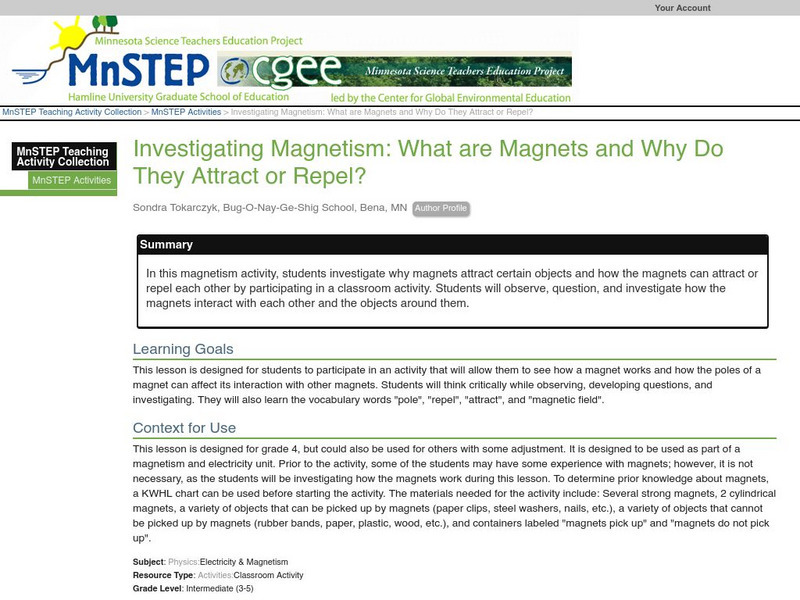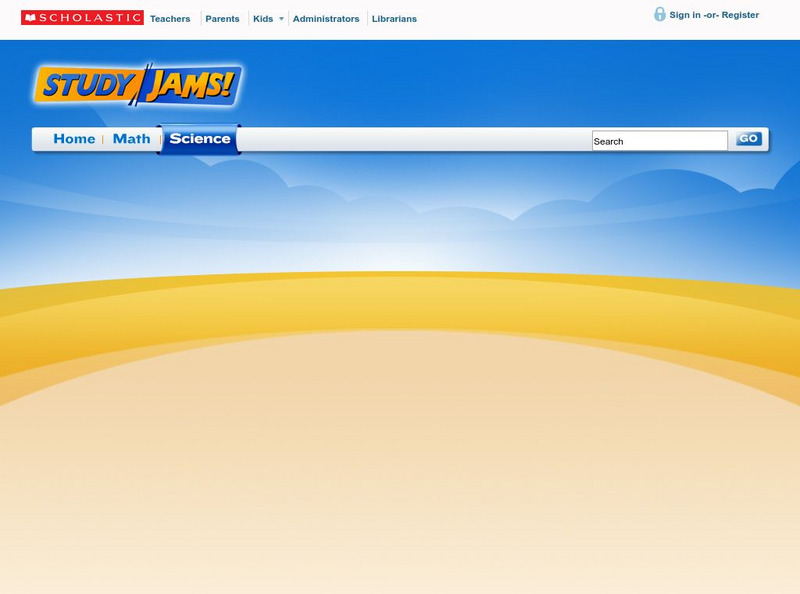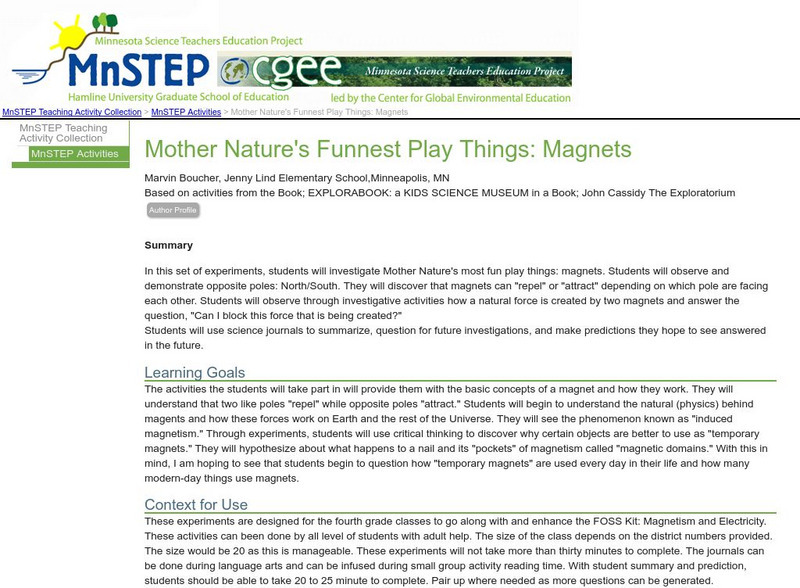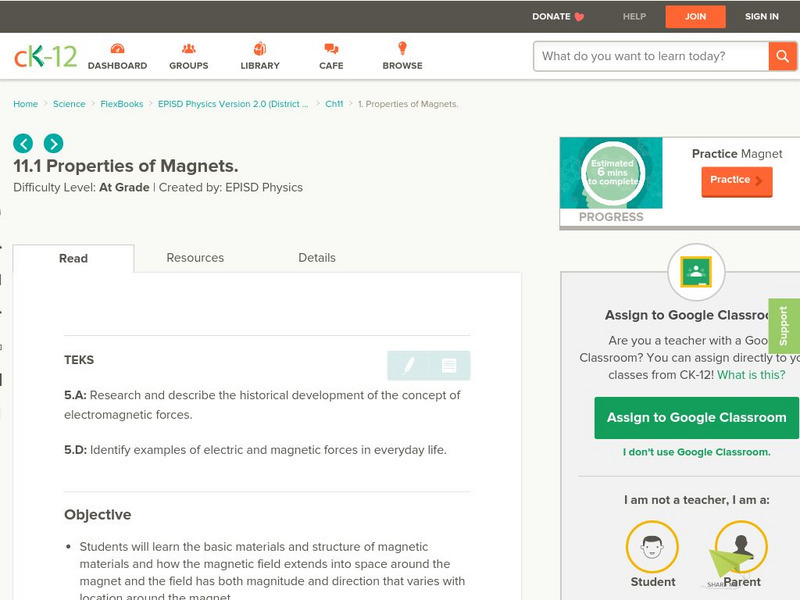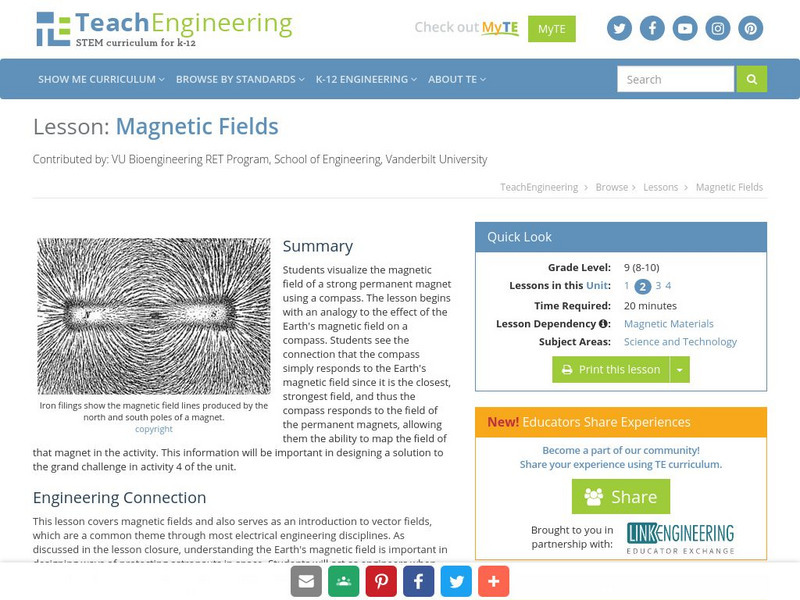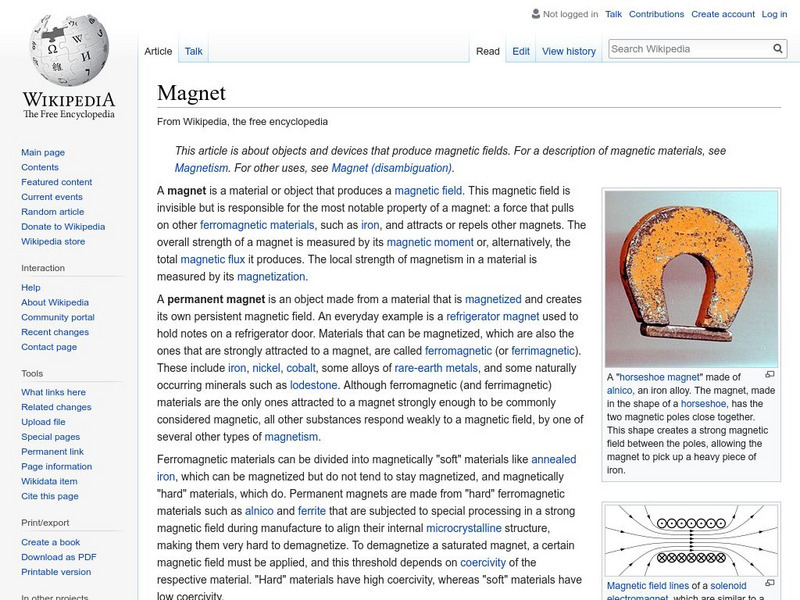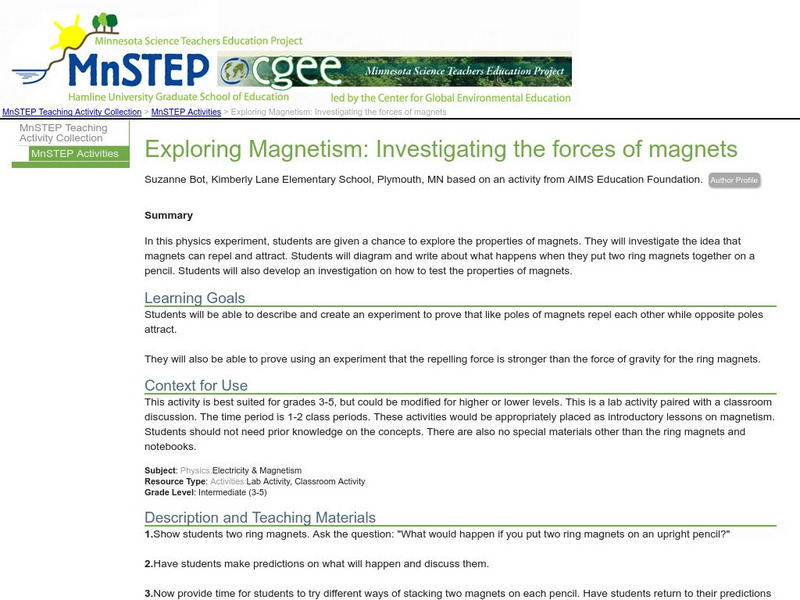Hi, what do you want to do?
Other
All About Circuits: Magnetism and Electromagnetism: Permanent Magnets
A good explanation of what the property of magnetism is and how it occurs naturally in lodestone and can be generated in metals such as steel. It describes how a ferromagnetic material such as iron becomes magnetized when near a...
Science Education Resource Center at Carleton College
Serc: Investigating Magnetism: What Are Magnets and Why Do They Attract or Repel
For this magnetism activity, students investigate why magnets attract certain objects and how the magnets can attract or repel each other by participating in a classroom activity. Students will observe, question, and investigate how the...
Georgia Department of Education
Ga Virtual Learning: Forces on Moving Charges in Magnetic Fields
In this interactive tutorial students will explore magnetic force. Students will observe interactions of magnets and study magnetic fields. The source of magnetic properties is believed to be moving charge. Since moving charge produces...
Science Buddies
Science Buddies: The Strength of an Electromagnet
Has anyone ever told you that you have a magnetic personality? Have you ever heard that opposites attract? These common phrases are both based on the properties of magnets and magnetic electricity. In this science fair project, learn how...
CK-12 Foundation
Ck 12: Physical Science: Magnets
A module that uses pictures, videos, reading passages, and review question to go over what a magnet and magnetic pole are, and how magnetic force is related to magnetic field. This site may require free registration to access all...
National High Magnetic Field Laboratory
Magnet Academy: William Gilbert
William Gilbert was an English physician and natural philosopher who wrote a six-volume treatise that compiled all of the information regarding magnetism and electricity known at the time. The work included descriptions of many of...
Other
Integrated Magnetics: Magnet Frequently Asked Questions
Answers to many Frequently Asked Questions on magnets and magnetism.
National High Magnetic Field Laboratory
Magnet Academy: Magnets From Mini to Mighty
If your knowledge of magnets ends with posting a to-do list on the fridge, add this to the list. Learn more about magnets! You can start here with a straightforward rundown of magnet types, uses and strengths, explained in a way that...
Scholastic
Scholastic: Study Jams! Science: Energy, Light and Sound: Magnetism
A slideshow and a short multiple-choice quiz on the basic concepts and vocabulary of magnetism.
Other
Magnet Man: Cool Experiments With Magnets
Here is a lengthy listing of activities and resources pertaining to magnets and magnetism. Experiments which can be performed with many different types of magnets are described; detailed directions and photos are provided.
Science Education Resource Center at Carleton College
Serc: Mother Nature's Funnest Play Things: Magnets
In this experiment, students will investigate magnets and how they work. They will understand that two like poles "repel" while opposite poles "attract." They will also observe how a natural force is created by two magnets and answer the...
CK-12 Foundation
Ck 12: Properties of Magnets
[Free Registration/Login may be required to access all resource tools.] Looks at magnetic materials and the structure and breadth of a magnetic field. The concept of magnetic domains is explained, and how they behave in a magnetic field....
TeachEngineering
Teach Engineering: Magnetic Attraction
Students complete a series of six short investigations involving magnets to learn more about their properties. Students also discuss engineering uses for magnets and brainstorm examples of magnets in use in their everyday lives.
Science Education Resource Center at Carleton College
Serc: Investigating With Magnets: Attraction and Repelling
In this fun lab activity, students will learn about the attraction and repulsion of magnets. Students will discover that like poles repel while unlike poles attract.
TeachEngineering
Teach Engineering: Magnetic Fields
Students visualize the magnetic field of a strong permanent magnet using a compass. The lesson begins with an analogy to the effect of the Earth's magnetic field on a compass. Students see the connection that the compass simply responds...
TeachEngineering
Teach Engineering: Drawing Magnetic Fields
Students use a compass and a permanent magnet to trace the magnetic field lines produced by the magnet. By positioning the compass in enough spots around the magnet, the overall magnet field will be evident from the collection of arrows...
Wikimedia
Wikipedia: Magnet
Wikipedia.com provides an excellent introductory site on magnets. Including basic information describing different types of magnets and their characteristics.
PBS
Pbs Learning Media: Magnets!
Learn about magnets, magnetic forces, and how magnets make things move.
CK-12 Foundation
Ck 12: Fifth Grade Science: Physical Science: Earth as a Magnet
[Free Registration/Login may be required to access all resource tools.] Looks at the Earth as a magnet and how Earth's magnetism benefits living things.
Science Struck
Science Struck: Fun and Interesting Facts About Magnets
Discusses some history of magnets, the science of magnetism, and interesting facts about them.
Alabama Learning Exchange
Alex: How Do Magnets Work?
During this lesson students will examine magnets and determine that they have two poles (north and south). They will observe which poles attract and which poles repel.
NASA
Nasa: Magnetic Fields
This site from NASA provides a short, illustrated description of the basics of magnetic fields and magnetic poles.
Science Education Resource Center at Carleton College
Serc: Exploring Magnetism: Investigating the Forces of Magnets
Learners describe and create an experiment to prove that like poles of magnets repel each other while opposite poles attract. Using the experiment, they use the data to support the claim that the repelling force is stronger than the...
Alabama Learning Exchange
Alex: The Magnetic Maglev Train
This is a hands-on, inquiry-based lesson plan that includes three magnetic stations in which young scholars or small groups rotate in order to test and discover different magnetic properties and then use their knowledge to build a Maglev...






